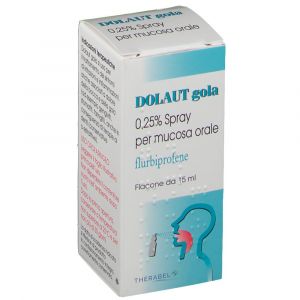Ship in Europe, Find out rates!

Therabel Dolaut Throat Mucosa Treatment Spray 15ml
THERABEL GIENNE PHARMA
Therapeutic indications
Symptomatic treatment of irritative-inflammatory states also associated with oropharyngeal pain (eg gingivitis, stomatitis, pharyngitis), also as a consequence of conservative or extractive dental therapy.
Dosage
The recommended dose is 2 sprays 3 times a day, addressed directly to the affected area.
Overdose
Symptoms Symptoms of overdose may include nausea, vomiting and gastrointestinal irritation. Treatment Treatment should include gastric lavage and, if necessary, correction of the serum electrolyte picture. There is no specific antidote for flurbiprofen.
Contraindications
Hypersensitivity to flurbiprofen or to any of the excipients listed in section 6.1. Patients who have previously experienced hypersensitivity reactions (e.g. asthma, urticaria) after taking aspirin or other NSAIDs. Patients with a history of gastrointestinal bleeding or perforation related to previous NSAID treatment. Patients with active or anamnestic ulcerative colitis, Crohn's disease, recurrent peptic ulcer or gastrointestinal haemorrhage (defined as two or more distinct episodes of proven ulceration or bleeding). Patients with severe cardiac, renal or hepatic insufficiency. Third trimester of pregnancy.
Side effects
The following adverse reactions, particularly reported following administration of systemic formulations, are reported according to the MedDRA classification. Frequency groupings are classified according to the following convention: very common (≥ 1/10), common (≥1 / 100 to <1/10), uncommon (≥1 / 1000 to <1/100), rare ( ≥ 1 / 10,000 to <1/1000), Very rare (<1 / 10,000) and Not Known (frequency cannot be estimated).
| MedDRA system organ classification | Frequency | Adverse Reaction |
| Disorders of the blood and lymphatic system | Uncommon | Anemia |
| Very rare | Leukopenia, agranulocytosis, aplastic anemia, neutropenia, thrombocytopenia, haemolytic anemia. | |
| Disorders of the immune system | Uncommon | Hypersensitivity |
| Rare | Anaphylactic reaction | |
| Psychiatric disorders | Rare | Depression, confusional state |
| Very rare | Hallucination | |
| Nervous System Pathologies | Common | Migraine, dizziness |
| Uncommon | Paresthesia | |
| Rare | Somnolence, Insomnia | |
| Not known | Optic neuritis, cerebrovascular accident | |
| Eye disorders | Uncommon | Vision alteration |
| Ear and labyrinth disorders | Uncommon | Tinnitus, vertigo |
| Respiratory, thoracic and mediastinal disorders | Uncommon | Asthma, dyspnoea |
| Rare | Bronchospasm | |
| Gastrointestinal disorders | Common | Dyspepsia, diarrhea, nausea, vomiting, abdominal pain, flatulence, constipation, melaena, haematemesis, gastrointestinal haemorrhage |
| Uncommon | Gastritis, duodenal ulcer, gastric ulcer, mouth ulcer, gastrointestinal perforation | |
| Very rare | Pancreatitis | |
| Not Known | Colitis and Crohn's disease | |
| Hepatobiliary disorders | Very rare | Jaundice, cholestatic jaundice, abnormal liver function |
| Skin and subcutaneous tissue disorders | Uncommon | Rash, urticaria, pruritus, purpura, angioedema, photosensitivity reactions |
| Very rare | Severe forms of bullous skin reactions (eg Erythema Multiforme, Stevens-Johnson Syndrome and Toxic Epidermal Necrolysis) | |
| Renal and urinary disorders | Rare | Nephrotoxicity in various forms ie tubulointerstitial nephritis, nephrotic syndrome, renal failure and acute renal failure. (see section 4.4) |
| Not known | Glomerulonephritis | |
| General disorders and administration site conditions | Common | Fatigue, malaise, edema |
| Cardiac pathologies | Uncommon | Heart failure |
| Vascular pathologies | Uncommon | Hypertension |
| Diagnostic tests | Common | Liver function test abnormal, prolonged bleeding time |
| Metabolism and nutrition disorders | Common | Fluid retention |
Pregnancy and breastfeeding
Fertility The use of DOLAUT THROAT may adversely affect fertility and is not recommended in women attempting to conceive. In women who have difficulty conceiving or who are undergoing fertility investigations, discontinuation of DOLAUT THROAT should be considered. Pregnancy Inhibition of prostaglandin synthesis may adversely affect pregnancy and / or embryo / fetal development. Results of epidemiological studies suggest an increased risk of miscarriage and cardiac malformation and gastroschisis after use of a prostaglandin synthesis inhibitor in early pregnancy. The absolute risk of cardiac malformations increased from less than 1% to approximately 1.5%. The risk was believed to increase with dose and duration of therapy. In animals, administration of prostaglandin synthesis inhibitors has been shown to cause an increase in pre- and post-implantation loss and embryo-fetal mortality. Furthermore, an increased incidence of various malformations, including cardiovascular, has been reported in animals given prostaglandin synthesis inhibitors during the organogenetic period. During the first and second trimester of pregnancy, flurbiprofen should not be administered except in strictly necessary cases. If flurbiprofen is used by a woman attempting to conceive or during the first and second trimester of pregnancy, the dose and duration of treatment should be kept as low as possible. During the third trimester of pregnancy, all prostaglandin synthesis inhibitors can expose the fetus to: • Cardiopulmonary toxicity (with premature closure of the arterial duct and pulmonary hypertension); • Renal dysfunction, which can progress to renal failure with oligo – hydroamnios; the mother and the newborn, at the end of pregnancy, to: • Possible prolongation of the bleeding time, an antiplatelet effect which can occur even at very low doses; • Inhibition of uterine contractions resulting in delayed or prolonged labor. Consequently flurbiprofen is contraindicated during the third trimester of pregnancy (see section 4.3). Breastfeeding In the few studies available to date, NSAIDs can appear in breast milk in very low concentrations. If possible, NSAIDs should be avoided during breastfeeding.
Special warnings
General precautions Undesirable effects can be minimized by using the lowest effective dose for the shortest possible duration of treatment needed to control symptoms (see section 4.2 and the paragraphs below on gastrointestinal and cardiovascular risks). Use in elderly patients Elderly patients have an increased frequency of adverse reactions to NSAIDs, especially gastrointestinal haemorrhage and perforation, which can be fatal. Gastrointestinal Effects Flurbiprofen should be administered with caution to patients with a history of peptic ulcer and other gastrointestinal diseases as these conditions may be exacerbated. Gastrointestinal bleeding, ulcer or perforation have been reported with all NSAIDs at any time during treatment. These adverse events can be fatal and can occur with or without warning symptoms or with a previous history of serious gastrointestinal events. The risk of gastrointestinal bleeding, ulcer or perforation is higher with increasing flurbiprofen dosage in patients with a history of ulcer, particularly if complicated with haemorrhage and perforation and in the elderly. These patients should start treatment with the lowest available dose. Concomitant use of protective agents (misoprostol or proton pump inhibitors) should be considered for these patients and also for patients taking low doses of aspirin or other drugs that may increase the risk of gastrointestinal events (see section below and section 4.5). Patients with a history of gastrointestinal disease, particularly if elderly, should report any unusual abdominal symptoms (especially gastrointestinal bleeding) in the initial stages of treatment. When gastrointestinal bleeding or ulceration occurs in patients taking Dolaut Gola the treatment should be discontinued. Respiratory Disorders Cases of bronchospasm have been reported with flurbiprofen in patients with a history of bronchial asthma. Reduced cardiac, renal and hepatic function Particular caution should be adopted in the treatment of patients with severely reduced renal, cardiac or hepatic function, as the use of NSAIDs can lead to deterioration of renal function. In such patients the dosage should be kept as low as possible and renal function monitored. Administration of an NSAID may cause a dose-dependent reduction in prostaglandin formation, accelerating renal failure. Patients at the highest risk of developing this reaction are those with impaired kidney function, heart failure and liver dysfunction, those taking diuretics, and older people. Renal function should be monitored in these patients (see also section 4.3). Cardiovascular and cerebrovascular effects Adequate monitoring and instruction are required in patients with a history of mild to moderate hypertension and / or congestive heart failure as fluid retention and edema have been reported in association with NSAID treatment. Dolaut Gola should be used with caution in these patients. Clinical studies and epidemiological data suggest that the use of some NSAIDs, especially at high doses and for long-term treatments, may be associated with a modest increased risk of arterial thrombotic events such as myocardial infarction or stroke. There are insufficient data to exclude such a risk for flurbiprofen. Patients with uncontrolled hypertension, congestive heart failure, established ischemic heart disease, peripheral arterial disease and / or cerebrovascular disease should only be treated with flurbiprofen after careful consideration. Similar considerations should be made before initiating long-term treatment in patients with risk factors for cardiovascular disease (eg, hypertension, hyperlipidaemia, diabetes mellitus, smoking). Skin reactions Serious skin reactions, some of them fatal, including exfoliative dermatitis, Stevens – Johnson syndrome and toxic epidermal necrolysis, have been reported very rarely in association with the use of NSAIDs. In the early stages of therapy, patients appear to be at higher risk: the onset of the reaction occurs in most cases within the first month of treatment. Flurbiprofen should be discontinued at the first appearance of skin rash, mucosal lesions or any other signs of hypersensitivity. Renal Effects Caution should be used when starting treatment with NSAIDs such as flurbiprofen in patients with considerable dehydration. Haematological Effects Flurbiprofen, like other NSAIDs, can inhibit platelet aggregation and prolong bleeding time. Systemic Lupus Erythematosus (SLE) and Connective System Diseases An increased risk of aseptic meningitis may occur in patients with Systemic Lupus Erythematosus (SLE) and connective system disorders (see section 4.8). The effects reported above have been reported in particular after the administration of formulations based on Flurbiprofen for systemic use. At the recommended doses, the possible swallowing of DOLAUT THROAT does not cause any harm to the patient as these doses are well below those of the single dosage of the product systemically. The use of DOLAUT GOLA, especially if prolonged, can give rise to sensitization phenomena or local irritation; in such cases it is necessary to interrupt the treatment and consult the doctor to establish, if necessary, a suitable therapy. Do not use for prolonged treatments. After short periods of treatment without appreciable results, consult your doctor. DOLAUT THROAT spray for oral mucosa contains a small amount of ethyl alcohol less than 100 mg per dose. Important information about some of the ingredients DOLAUT THROAT spray for oral mucosa contains a small amount of ethyl alcohol less than 100 mg per dose. For those who carry out sporting activities, the use of medicines containing ethyl alcohol can determine positivity to doping tests in relation to the alcohol concentration limits indicated by some sports federations. This medicine contains patent V blue dye (E131) which can cause allergic reactions.
Expiry and Retention
This medicinal product does not require any special storage conditions. After first opening, store at a temperature not exceeding 25 ° C and for no more than 30 days.
Active principles
100 ml oromucosal spray contains: Flurbiprofen 250 mg Excipient with known effect: ethanol For a full list of excipients, see section 6.1
Excipients
Propylene glycol, ethanol (96%), chlorhexidine digluconate solution, hydrogenated castor oil – 40 – polyoxyethylenate, sodium hydroxide, sodium saccharin, mint flavor, patent blue V (E 131), quinoline yellow (E 104), purified water.
